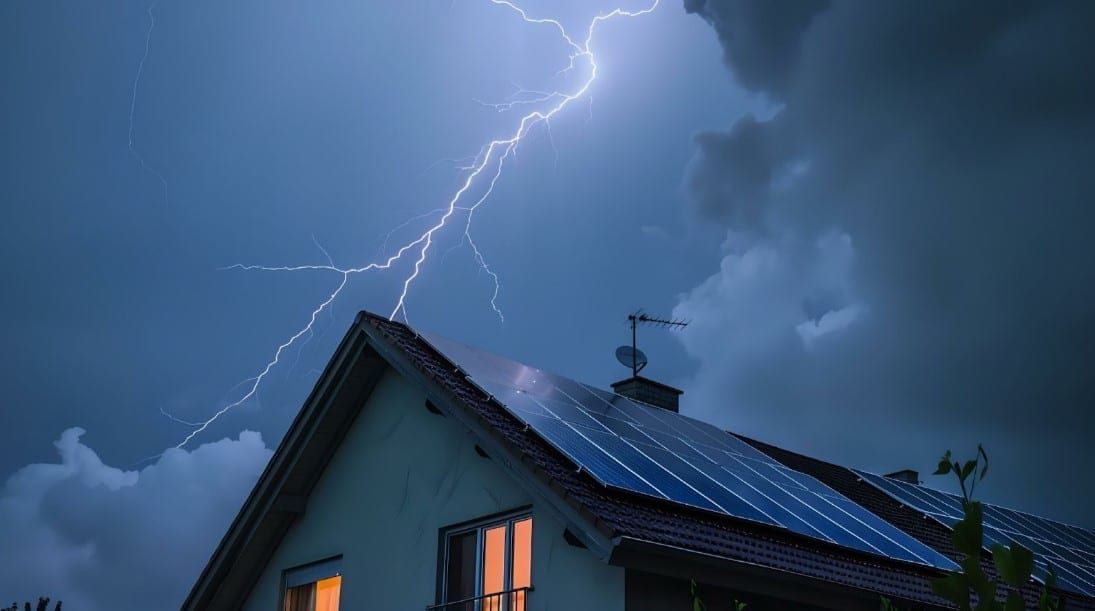How Solar Energy Keeps Homes Running When the Grid Fails
A home solar power installation is a great investment toward a cost-efficient and more sustainable future. But what happens when the grid goes down? Do solar-powered homes hold up just as well as fully electric ones?
Recent research from Stevens Institute of Technology, along with studies by Majowicz, Popli, and Odonkor in the Journal of Smart Cities and Society, reveals key differences in how these systems perform during blackouts.
Let’s break down their findings, both the big picture and the technical details, so you know what to expect when the lights go out
Key Takeaways:
- Solar-powered homes with battery storage can maintain power during outages, especially in summer when sunlight is abundant.
- Blackouts during winter months pose challenges due to reduced sunlight, increased heating demands, and battery limitations.
- A hybrid approach combining solar panels, battery storage, and backup generators offers the most resilient solution against power outages.
The Modern Home Energy Landscape
Today’s homeowners have more choices than ever when it comes to powering their homes. With solar panel systems becoming increasingly popular, the promise of lower electricity bills is hard to resist.
However, as more people rely on these renewable energy sources, we’re discovering that they come with challenges—especially when the grid goes down.
The Stevens Institute of Technology research highlights that while solar-powered homes have a lot to offer, they don’t always perform the same way as those that depend entirely on the grid. Still, improvements in technology and storage systems make solar power a more realistic and sustainable option for homeowners.
Meanwhile, the study by Majowicz and his colleagues takes a deep dive into how we can measure and compare the risks of power outages in these different types of homes. Both studies emphasize that the impact of a blackout can vary significantly based on the home’s setup.
What Methods Did the Researchers Use?
Massive Data and Smart Analysis
The researchers analyzed the energy use of 129,000 single-family homes in different states. They gathered a huge amount of consumption data to see how homes with solar PV systems fared compared to those that were fully electric.
Researchers developed models that could look at the usage patterns of each home and accurately determine whether it was powered by solar energy, fully electrified, or a mix of both. This is important because knowing what kind of system a home uses is the first step in figuring out how it will handle a blackout.
Creating a Risk Score for Outages
After identifying the type of system, the next step was to figure out how vulnerable each home was during an outage. The researchers created a composite risk index that takes into account:
- Electrification Profiles: How much a home relies solely on grid power versus having a mix with sun energy.
- Backup Capabilities: Whether the home has batteries or generators to keep things running when the power is out.
- Climate Exposure: How local weather conditions, like extreme heat or cold, affect the home’s electrical needs.
This risk index is like a scorecard that tells us which homes are most at risk during a blackout and why.
Seasonal Differences: When the Sun Shines and When It Doesn’t
Summer When Solar Shines Bright
Solar-powered homes have a definite advantage during the summer months. With long days and plenty of sunlight, a solar panel installation continues generating electricity even when there’s a blackout. This extra energy is especially important during heatwaves, when keeping your home cool isn’t just about comfort— it can be a matter of safety.
If you’ve ever experienced a summer blackout, you know how quickly temperatures can soar. For homes with
solar installation, this isn’t as big a problem because they can rely on the sun to keep generating power.
Winter: The Downside of Full Solar Electrification
The picture changes quite a bit in winter. In colder months, fully electrified homes (meaning they depend entirely on grid power) are at greater risk during blackouts—up to 60% more vulnerable, according to the studies. Here’s why:
- Less Sunlight: PV panels can be less effective in winter due to shorter days and a lower sun angle. Sometimes, snow cover can also reduce their efficiency.
- Heating Demand Goes Up: Fully electric homes use a lot of power to heat rooms, and when the grid fails, these homes struggle to keep warm.
- Storage Limitations: Even if PVs are still generating some electricity in winter, the batteries that store this electricity may not last long enough to meet the high demand for electric heating systems.
But with the right strategies, homeowners can guarantee reliable energy even in colder months.
How to Work Around This Challenge
| Optimized Placement | Panels can be positioned at steeper angles to capture more sunlight during shorter winter days. |
| Snow Management | Keeping panels clear of snow through manual removal helps maintain electric production |
| High-Capacity Battery Storage | The National Renewable Energy Laboratory highlights that advanced battery systems, like lithium-ion or lithium-iron-phosphate (LFP), store enough energy for use during power outages. |
| Hybrid Systems with Backup Generators | Combining solar with backup generators or a grid connection provides continuous power during extended cloudy periods. |
| Efficient Heating Solutions | Heat pumps, passive solar heating, and improved home insulation reduce demand. |
Digging Into the Technical Details
Your System Design Matters
One of the key technical insights from the research is that the design of a home’s energy system plays a huge role in its resilience during an outage. Solar-powered homes should come equipped with:
- Inverters and Charge Controllers: Convert the DC power from panels into usable AC power.
- Battery Banks: These store the energy generated during the day so it can be used at night or during outages.
The Promise of Smart Grids
One exciting area that the research touches on is the role of smart grid technology. A smart grid can manage power more dynamically by:
Rerouting electricity to where it’s needed most.
Managing loads by prioritizing essential services.
Integrating various sources, including panels and battery storage.
During a winter storm, for instance, a smart grid could help balance the load by shifting power to areas that are in immediate need, potentially mitigating some of the vulnerabilities seen in fully electrified homes.
What We Recommend for Homeowners
There isn’t a one-size-fits-all solution. Instead of relying exclusively on either grid power or solar energy, the most resilient approach is a hybrid model. This means installing solar panels with battery storage or even generators can help cover the gaps. Coquitlam Solar Energy highly considers the local climate when designing residential solar systems. Our team guarantees that areas with harsh winters have additional safeguards in place.

Install Solar Energy Systems with Coquitlam Solar Energy
In a time where the reliability of our power supply is more important than ever, understanding how different energy systems perform during blackouts is essential in planning for a resilient future.
Coquitlam Solar Energy offers in-depth consultation and reliable installation for any of your energy needs. Our solar panels cost competitively to help you switch to reliable energy as soon as possible.
If you’re a homeowner, these insights offer a clear message: the future of energy is bright, but only if we build it with sustainability and resilience in mind.
Frequently Asked Questions
What happens if a battery reaches full capacity during an outage?
If a battery is fully charged and power consumption is low, the excess energy generated has nowhere to go. Some advanced systems can divert excess solar energy to water heaters or other high-energy appliances, but without proper management, they may temporarily shut down until more storage capacity becomes available.
Do power outages damage solar power systems or batteries?
No, outages by themselves won’t harm your panels or batteries. However, extreme weather events that often cause these outages—think hurricanes, ice storms, or wildfires—can sometimes damage the equipment.
How does blackout duration affect solar-powered vs. electric-powered homes?
You might not notice much difference for a short outage lasting just a few hours. But during longer blackouts, homes with panels and battery storage shine compared to those relying solely on the grid. Once a battery starts to run low, it can recharge during daylight and help you maintain power. Meanwhile, homes that depend only on grid electricity will remain without power until the utility service is restored.
CONTACT
Telephone: 604-337-1958
E-mail: info@coquitlamsolarenergy.ca
LOCATION
Coquitlam, BC V3B 0A4, Canada
Coquitlam Solar Energy | All Rights Reserved | 2023
